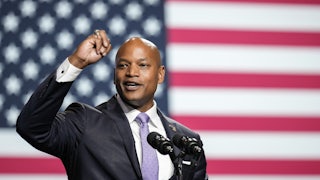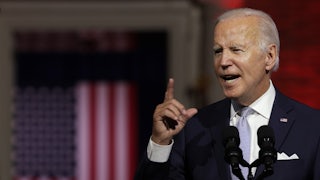On Thursday, barely 36 hours after the last polls closed on Election Day and when control of both the Senate and the House had yet to be called, The New York Times heralded on its homepage a piece of commentary by Frank Bruni. The former Times columnist, who now teaches journalism at Duke, breathlessly handicapped the contenders for the 2024 Democratic nomination if Joe Biden doesn’t run.
Bruni was far from alone. Over the weekend, Washington Post political reporter Aaron Blake published his own tip sheet assessing all the would-be 2024 Republican candidates, from top dog Florida Governor Ron DeSantis down to the tenth-place finisher, Florida Senator Rick Scott. Even before the 2022 elections, CNN commentator Chris Cillizza began offering his own candidate rankings on the 2024 nomination races in both parties.
Have we lost all sense of proportion?
We are just coming off congressional elections when the media couldn’t get the storyline right 24 hours in advance. The Republican red sea that most political reporters and TV commentators had conjured up proved to be a mirage in the desert of parched imaginations. Yet before all the 2022 races are even decided, the pundit parade—without a hint of humility—is eagerly handicapping what will happen at the conventions in the summer of 2024.
It isn’t as if we are suddenly lacking in political stories. Even if the Republicans manage to eke out a nominal House majority—which is still not certain—there is no guarantee that Kevin McCarthy can be elected speaker with the right-wing fanatics in the Freedom Caucus holding veto power. And even if McCarthy prevails, it is an open question whether he—or any GOP speaker—can actually govern with the inmates running the asylum.
Meanwhile, in our too-much-too-soon political culture, candidates are publicly weighing their options for 2024. Donald Trump’s speech scheduled for Tuesday—in which he supposedly will formally launch his 2024 comeback tour—represents a legitimate and major news story. So are the debates within the White House over whether Joe Biden should run again for president when he will be nearly 82 on Election Day 2024.
The problem is that political railbirds are never satisfied with merely analyzing decisions. Instead, they feel compelled to jump ahead and divine outcomes. The kind of stories that should be avoided at all costs are the ones that purport to look too far into the future.
Let’s be honest here—political reporters are terrible at predictions. At this point in 2014—the last time there were nominations up for grabs in both parties—few treated Donald Trump as a serious contender. Immediately after the midterm elections, Time ranked a dozen contenders for the 2016 GOP nomination without ever mentioning a shameless, oft-bankrupt reality TV star. The top two would-be presidents were former Florida Governor Jeb Bush (who was pummeled in the primaries despite a nine-digit bankroll) and triumphant Wisconsin Governor Scott Walker, whose sputtering campaign ended before Halloween 2015. As The New York Times put it when the governor, widely touted by the TV pundit panels, hoisted the white flag, “When Walker first entered the 2016 conversation, the Midwestern governor appeared to have it all.”
On the Democratic side, the conventional wisdom was that Hillary Clinton would romp to the nomination with minimal opposition from former Maryland Governor Martin O’Malley and a left-wing gadfly senator who wasn’t even officially a Democrat named Bernie Sanders. An ABC News/Washington Post poll in December 2014 put Clinton at 61 percent and Sanders at a microscopic 4 percent. Anyone who predicted back then that Sanders would mount a serious challenge to Clinton would have been laughed off a TV panel.
Undeterred by the dubious historical track record of early candidate preference surveys, pollsters are already asking voters who they favor for 2024. According to the RealClearPolitics averages, Trump has a better than 2-to-1 lead over DeSantis.
Such early polling mostly measures name recognition, since even DeSantis remains a blurry figure to many non-Florida Republicans who are not obsessed with politics. National polls about 2024 also ignore the reality that states vote sequentially with the results in one state often affecting the outcomes for the next primaries on the calendar. But right now—especially on the Democratic side—we do not even know the basics, such as which states will go first in 2024. Later this year, the Democratic National Committee will unveil its calendar for 2024 with the Iowa caucuses likely headed to oblivion.
What early polling also misses is that voters in presidential primaries are notoriously fickle. With all the candidates in the same party, it is easy for voters to vacillate among several candidates before they cast their ballots. A 2016 study by the Pew Research Center found that 44 percent of the Democratic primary voters they polled had changed their allegiance at least once during the battle for the nomination—and that was during an unusually uncrowded year, mostly just a contest between Sanders and Clinton instead of the typical free-for-all of most open nominations.
I am not suggesting that political reporters should ignore the tensions in the Republican Party over the Trump-DeSantis rivalry or Democratic discomfort about an octogenarian president running for another term. But too many political reporters overconfidently believe that they can forecast the next two years in politics without any idea of the state of the economy, the public mood, the outcome of the war in Ukraine, the status of the legal investigations of Trump, or the latest disruptions by a rogue Supreme Court.
The problem with these guessing games is that they reduce the question of governing this country in a time of torment to a sports contest. Baseball fans may find it diverting in the off-season to speculate where current Yankees star Aaron Judge may end up as this year’s priciest free agent. But political reporting should be held to a higher standard. The most truthful words about 2024 that any pundit can utter are these: “I don’t know, and nobody else does either.”






